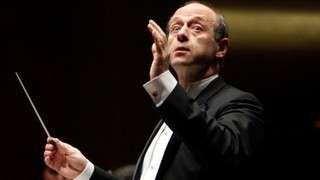|
Back
The Notes Of The Fischer-Men New York
Stern Auditorium, Carnegie Hall
02/18/2016 - & February 15 (Washington), 18 (Montréal), 2016
Carl Maria von Weber: Overture to Der Freischütz
Liszt Ferenc: Piano Concerto No. 1 in E-flat Major
Sergei Prokofiev: Symphony No. 5 in B-flat Major, Opus 100
Marc-André Hamelin (Piano)
Budapest Festival Orchestra, Iván Fischer (Music Director and Conductor)

I. Fischer (© Richard Termine)
”New York's not snowless or slushless or mistless!
Our weather’s so tiring...(but at least we’re not Lisztless).”
From Ode To My Landlord, by Herring Rollmop
Not this weekend anyhow. Like the recent weather, Liszt has taken New York by storm. Both Liszt piano concertos are being played this week. Two major orchestras, two major pianists, two major concert halls, and two gifts for those who appreciate that Liszt is the one composer who disguises bombast and vulgarity–simply by clothing it with the most divine inspiration.
When growing up, I was “taught” that Ferenc Liszt (we’ll spell it the Hungarian way in honor of Maestro Fisher’s Budapest Festival Orchestra) was not really “good music”. Yet when I heard one of my first records, Rubinstein playing the E-Flat Concertoy which we heard tonight, I couldn’t help loving those melodies and the frills and filigrees around the tunes.
For the grandiose old-style pianists, this Concerto has a bold boastful joy. For newer pianists, the work can seem like a chance for exaggeration and a sure-fire applause getter.

M-A. Hamelin (© Fran Kaufman)
Now it would be understating Marc-André Hamelin’s affinity for Liszt, since he seems to have an affinity with every single facet of keyboard literature. He discovers, arranges, parodies, performs everything pianistic (though I don’t recall his Bach). Yet I had prior misgivings tonight, through one incident several years ago. Mr. Hamelin played the Dvorák Piano Concerto in Carnegie Hall. Either the music, the orchestra or conductor was not up to his standard. He ran through it quickly, came out for a quick bow, then disappeared.
Last night, we heard a partnership between Mr. Fischer’s own orchestra, the conductor, Mr. Hamelin and the Carnegie Hall acoustics which had to have been made in musical heaven.
From the firstMarcato notes, set out by both artist and orchestra, one expected that this would be an electrifying performance. Yet we had a grand surprise. Mr. Hamelin did have that incandescent touch, but he added–perhaps with a bit too much rubato, though nobody cared–a real sense of sensitivity, of gentleness when called for.
That opening was bold enough, but Mr. Hamelin was happy to appeal more mildly after the clarinet theme. His cadenzas were dazzling, but Mr. Fischer allowed the orchestra to coil around the pianist in partnership.
The second section Quasi adagio was never cloying, nor did Mr. Hamelin exercise his soloistic rights. This was a sensitivity with the orchestra, one which led to the grand finale. (Yes, the “triangle” finale which original critics hated.) At the end, one felt that Mr. Hamelin never “ran through” the Liszt as he had the Dvorák. His embrace of the conductor and the long Liszt encore were proof that this Liszt had a grandeur which transcended what was probably Liszt’s own showmanship.
Then again, one cannot help but relish any appearance by the Budapest Festival Orchestra. At its genesis, I had been running a magazine in Hungary, astonished at the number of terrible orchestras formed under the Communist regime. So, obviously, was Iván Fischer. He had the chuzpah (or whatever the Magyar word was) to work outside the Government system, form his own orchestra, actually rehearse them and actually fire those not up to his standards.
What had been a brilliant local ensemble quickly gained a reputation in Europe, and today in America. Mr. Fischer had branched out as well, but he never forgets his roots, and takes special pride in his ensemble.
They are obviously a Central European orchestra. They lack blazoning sounds or lilting lightness of older groups, but they have their own moods. Mr. Fischer has made them actually breathe.They almost have a sentience, a tactile closeness.
For the opening Weber Der Freischütz overture, the four horns which utter that magnificent opening were separated on the two sides of the orchestra. A lovely gesture, but hardly needed, since the quartet had its own liquid sounds, which melted into the rest of the work.
Yet the final piece, that always popular Prokofiev Fifth Symphony revealed the secret to the Budapest Festival Orchestra. Mr. Fischer might not want to admit it, but his group had a very Russian color here. Not that one noticed growling trombones. Rather, one felt that Mr. Fischer was pushing them into picturesque and exciting exotic lands.
It was the third movement where Mr. Fischer showed what wonders he can create. One rarely thinks of Prokofiev as deeply tragic (save in his “War” piano sonatas), and this movement was heartwarming rather than truly expressive. Mr. Fischer, though, gave it an expanse and a breadth and a pulse that never flagged.
Like the Liszt, the Prokofiev finale was pure energy: sardonic, clever, optimistic, with a whirling energy as appropriate for Prokofiev as a reeling spinning Hungarian dance.
Harry Rolnick
|